We’re born with smooth and glowing skin as babies.
However, as we get older, there is a divide between people whose skin remains clear and those whose skin does not.
Why does this difference occur?
One key difference. which we will discuss in this article, is MOISTURIZATION.
Understanding and practicing correct moisturization will help you keep your skin beautiful.
But what is moisturizing?
Many people may be surprised to find out that they do not know the answer to this question.
In this article, we will introduce the basics of correct moisturizing, why it is necessary to moisturize, and how to practice correct moisturization.
What does it mean to moisturize?
To moisturize is to 1) replenish water to the skin and 2) prevent water within the skin from evaporating.
Therefore, the skin is not moisturized just from hydrating it.
It can only be moisturized with the skin is hydrated AND that hydration stays within the skin.
In fact, our skin has a barrier function that helps keep our skin moisturized without conducting any skincare.
Below, we introduce the 3 factors of the skin barrier function and how it helps our skin.
What is the skin barrier function?
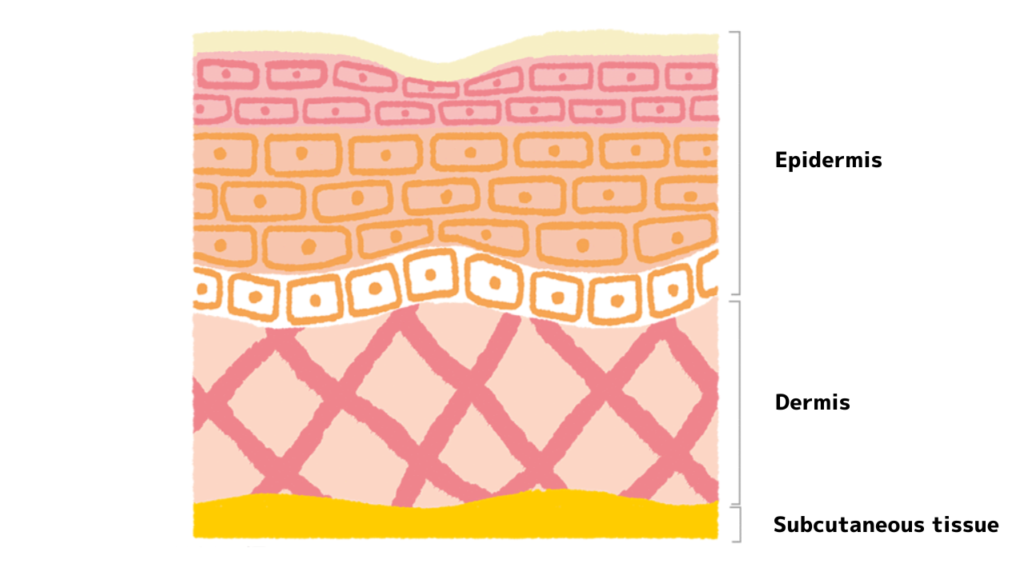
Our skin has 3 layers: the epidermis, dermis, and subcutaneous tissue.
Among these 3, the epidermis is most important for retaining moisture.
The epidermis is only about 0.2mm thin, but it can be divided into 4 layers: the stratum corneum, stratum granulosum, spinous layer, and basal layer (melanocytes).
Among these 4, the most important layer is the stratum corneum.
The stratum corneum is responsible for retaining moisture, but also for prevent stimulation from external irritants.
The stratum corneum has 3 moisturizing components.
3 moisturizing components of the stratum corneum
・Natural Moisturizing Factor (NMFs)
・Intercellular lipid
・Sebaceous film
Natural Moisturizing Factor (NMFs)
NMFs are produced when skin cells are renewed – dead skin cells move up from the stratum granulosum to the stratum corneum.
Specifically, a component called profilaggrin in the stratum granulosum is broken down into a component called filaggrin as it moves up to the stratum corneum.
And when filaggrin is broken down by enzymes in the stratum corneum, a component called urea is released, and NMFs are produced.
The role of NMFs is to attract water in the stratum corneum, maintain that water within the cells, and keep the skin moisturized.
Intercellular lipids
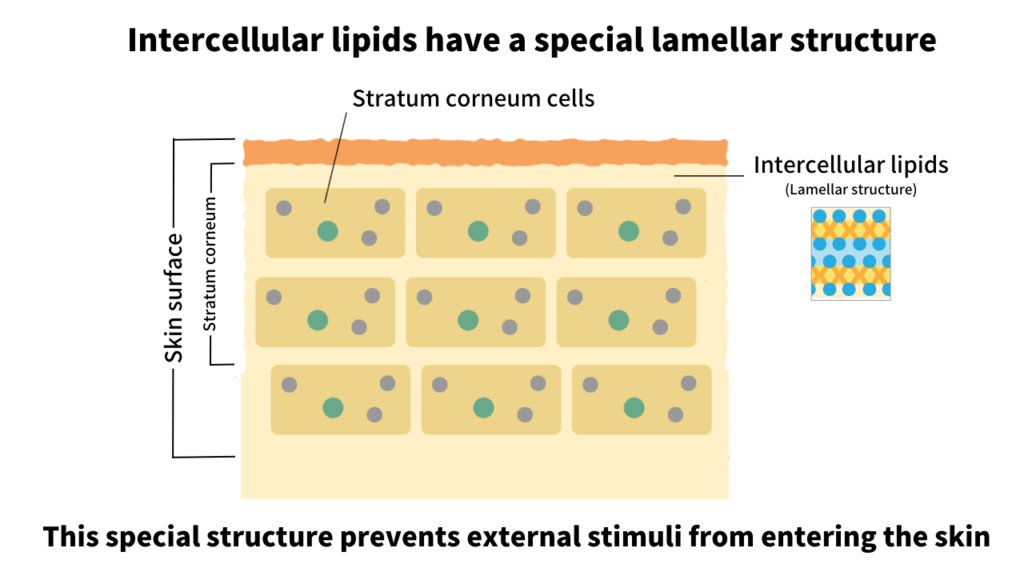
As the name suggests, intercellular lipids are found within cells.
50% are made up of ceramides, which are known to be good moisturizing ingredients.
Similar to NMFs, intercellular lipids are produced in the stratum corneum of the epidermis.
Specifically, stratum corneum granules are produced in the stratum granulosum, which contain ingredients for intercellular lipids.
When skin cells die, the intercellular components are released into the stratum corneum during the skin’s turnover process and function as intercellular lipids.
Intercellular lipids in the stratum corneum are made with alternating layers of water and oil, which prevent the entry of both water-soluble and oil-soluble componenets.
Sebum film
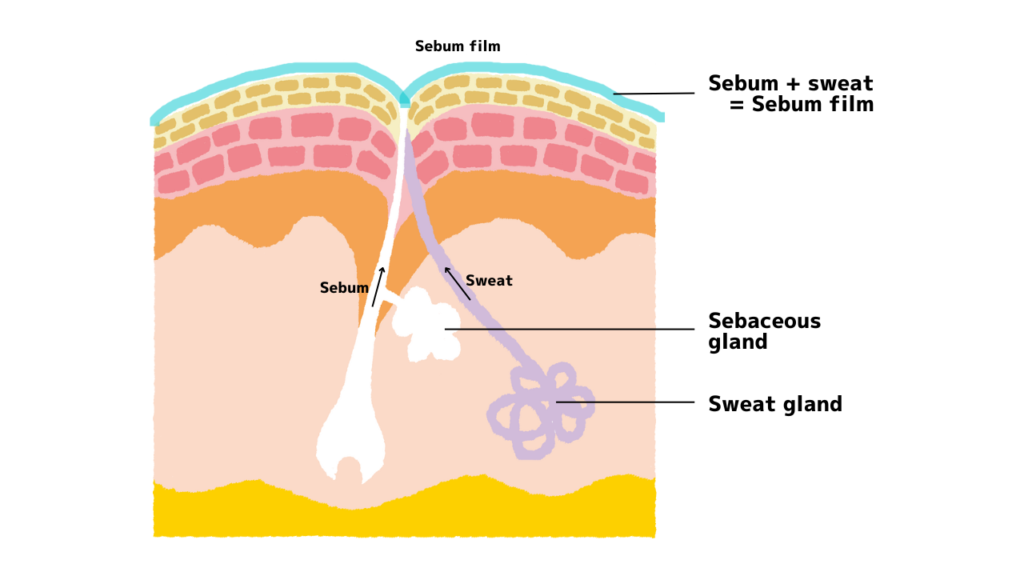
The sebum film is created when sebum and sweat mix together.
The role of the sebum film is to protect the skin from external irritants, as well as to prevent the hydration within the skin from evaporating.
Through the skin’s barrier function (which is made up of NMFs, intercellular lipids, and the sebum film), our skin remains protected and strong.
However, even with this barrier function, many people still experience dry skin.
Why is that?
This is because there are factors that disrupt this skin barrier function.
Causes of a disrupted skin barrier function
1. Changes in environment
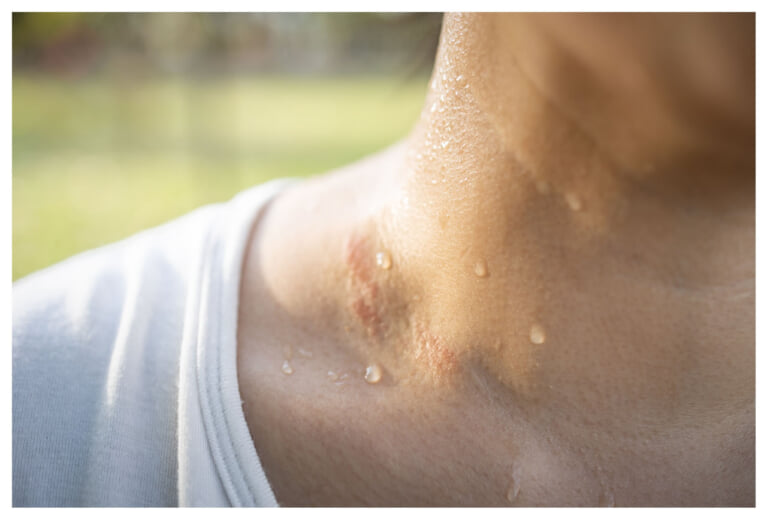
Previously, we mentioned that the sebum film is created when sebum and sweat mix together.
This means that the skin’s barrier function can only exist when we sweat and release sebum.
However, in recent years, people have been sweating less due to changes in their environment.
For example, imagine your work life.
Now, many people do desk work at an office.
Even if you work all day, you hardly sweat because you are not moving around.
In addition, air conditioners were invented.
Even in the summer and hotter months, your environment remains cold.
Because sweat and sebum are released in equal amounts, we sweat less = we produce less sebum.
In other words, changes in our work and life environments have decreased the amount of sweat and sebum that we produce – both of which are essential for the skin barrier function to work.
2. Lack of sleep
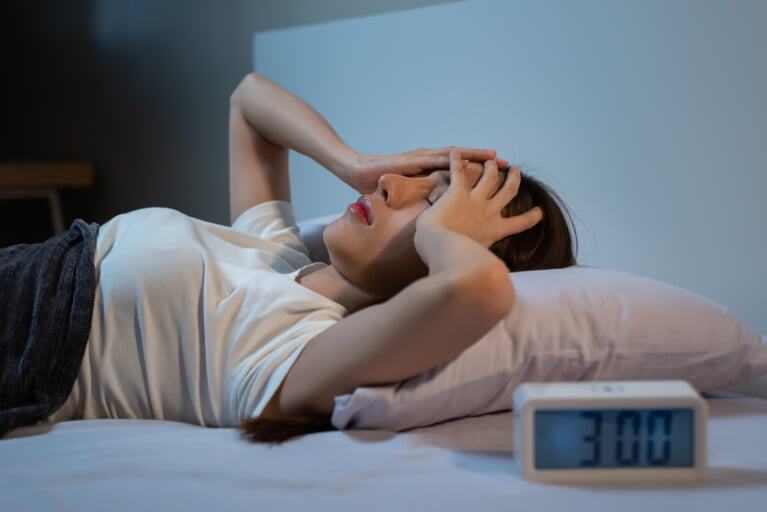
Lack of sleep only has negative consequences for skin.
The reason why is because a lack of sleep disrupts the skin’s turnover cycle.
Skin is constantly renewing its cells. This process is called the turnover cycle and usually lasts 28 days for healthy skin.
If your skin’s turnover cycle is functioning properly, your skin will always be in a healthy state.
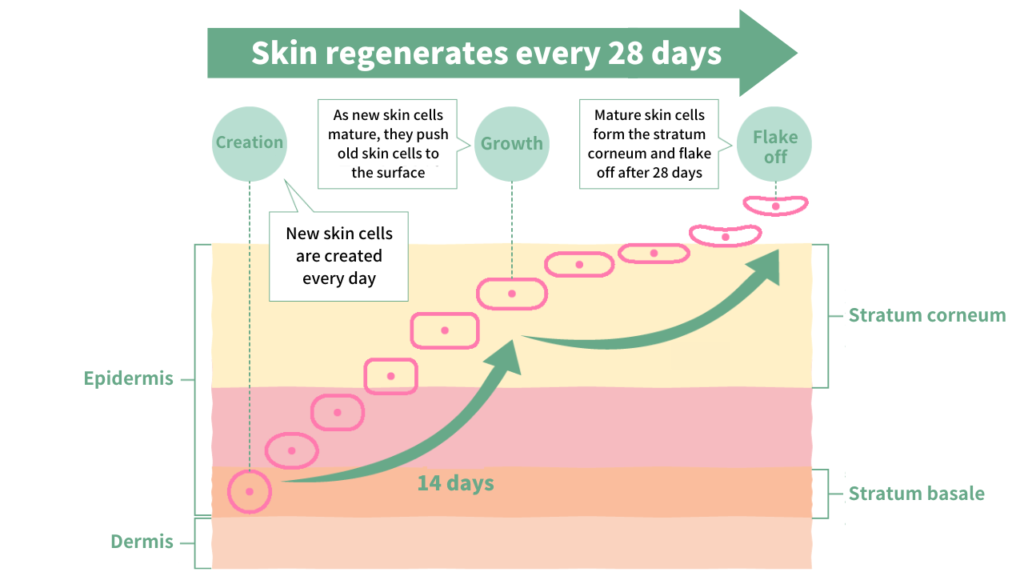
However, a lack of sleep can disrupt this turnover cycle – regardless of age.
This is because a growth hormone is released during sleep, and this hormone is essential for the skin’s turnover process.
Without sleep, this growth hormone cannot be released.
Without sleep, the skin’s turnover process is disrupted and weakens the skin barrier.
This causes the old and dead skin cells to not be released.
3. Not drinking enough water
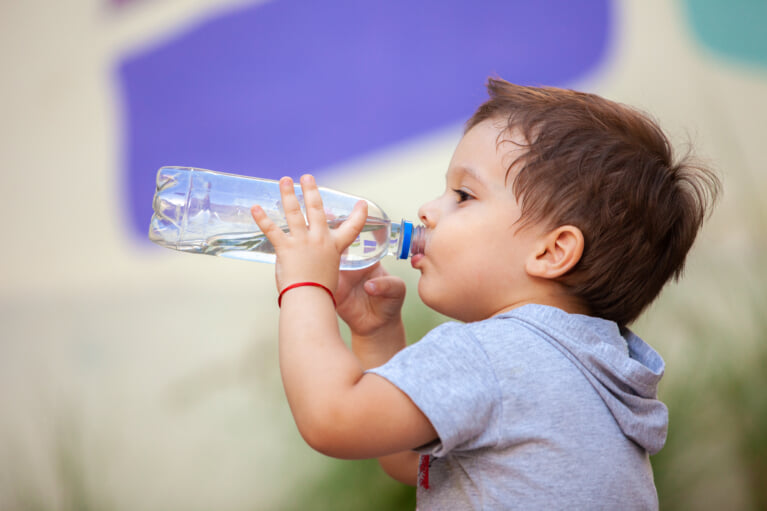
Our body’s cells need water, specifically water that we intake from our mouth.
If you do not drink enough water, it can cause the skin to lose its ability to retain moisture.
When drinking water, it is absrobed through the mucous membrane of the small intestine and sent to the bloodstream.
The absorbed water is then transported to the liver for processing before circulating throughout the entire body. The circulating water moves into the intercellular field.
In the case of the skin, the water supplies the basal layer of the epidermis.
In other words, if there is not enough water inside the body, it decreases the amount of water supplied to the skin, and makes the skin more dry.
4. Dryness caused by aging
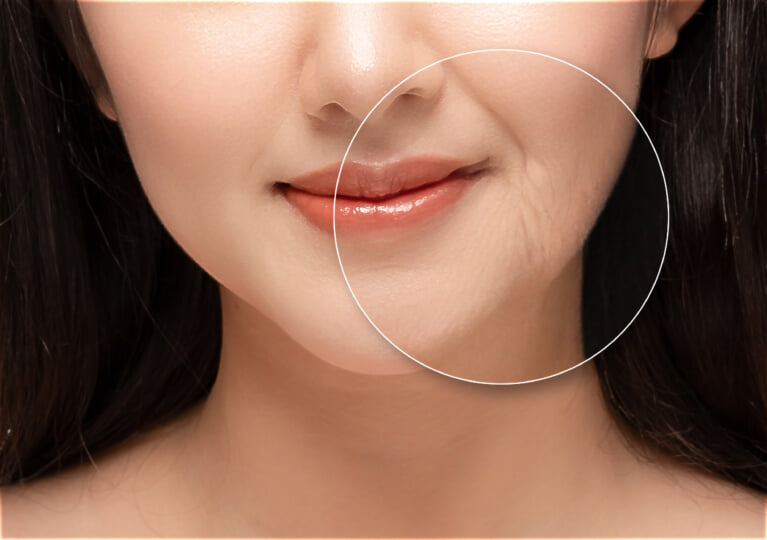
You may have experienced a sudden dryness of your skin at a certain age, even though you never had dry skin when you were younger.
Unfortunately, the skin’s barrier funcion declines with age.
As we age, the secretion of NMFs and sebum decreases.
In addition, we become less active during the day so we do not sweat as much, and the ability to form the sebum film also declines.
As the skin ages, the mother cells lose their energy and the skin’s turnover cycle decreases.
This leads to a build-up of dead skin cells and a decline in the barrier function.
The elements of the barrier function that are necessary to maintain the skin’s moisturization decline with age.
5. Incorrect skincare
Skincare is incredibly important.
However, incorrect skincare can be counterproductive and cause the skin to become more dry.
Below are the most common skincare mistakes people make.
Common skincare mistakes
・Only using toners to moisturize
・Causing too much friction and irritation to the skin
To restate, moisturizing is to hydrate the skin and prevent that hydration from evaporating.
This means that you must apply water to hydrate the skin AND oil to seal the hydration within the skin.
Therefore, you cannot moisturize the skin just by using toners.
No matter how much you hydrate your skin, it is pointless if it evaporates.
Moreover, the more evaporation, the more your skin will be dry.
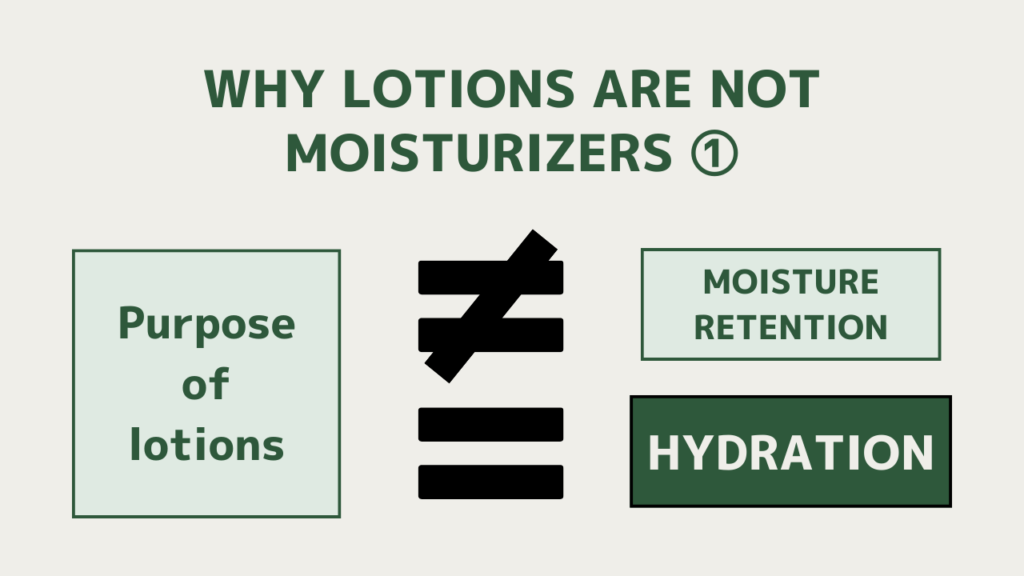
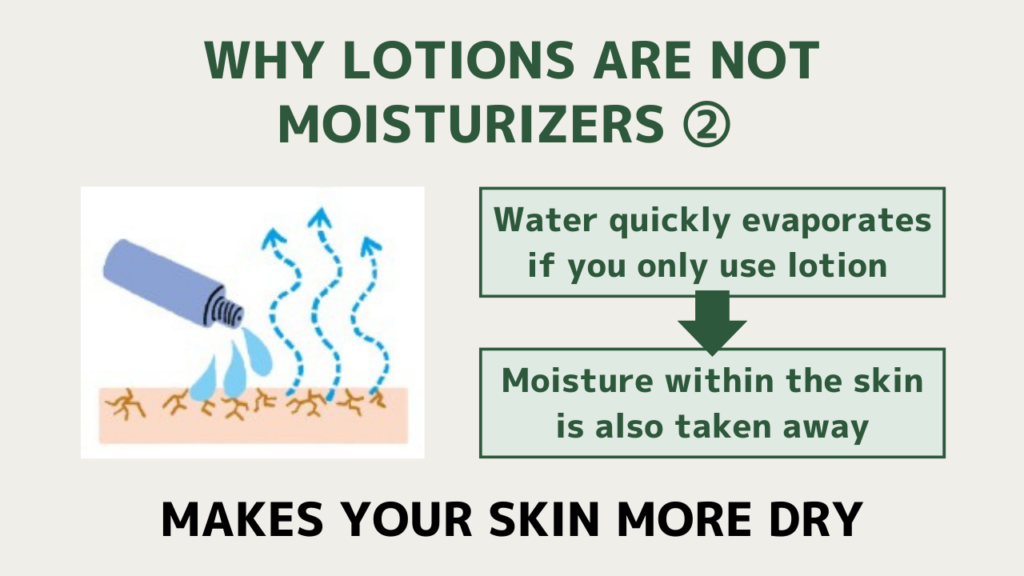
In fact, when we moisturize our skin, we are irritating our skin.
This irritation disrupts the skin’s barrier function and can decrease its ability to retain moisture.
So then how can you moisturize your skin without irritating it?
Keep reading to find out!
How to moisturize correctly
Long story short, the correct way to moisturize is by providing a proper balance of moisture and oil to your skin at the same time.
This may sound like common sense, but it there are many people who are not able to do this.
How to moisturize correctly
・Proper balance of water and oil
・Replenish water and oil at the same time
Proper balance of water and oil
The golden ratio of water:oil is 8:2.
Interestingly enough, this ratio is the same as that of a baby’s skin.
In other words, it is important to examine whether you are conducting your skincare with this ratio.
For example, if you are using multiple skincare products, using too many water-based products is not good, and using too many oil-based products is also not good.
Replenish water and oil at the same time
As explained above, only using toners to moisturize the skin will cause the hydration to evaporate quickly and dry out the skin.
Similarly, only applying oil-based products to the skin will not moisturize the skin because it does not contain any water.
Therefore, both are needed at an optimal balance (8:2) and at the same time to moisturize correctly.
However, it is very difficult to measure the exact ratio of water and oil of your skincare products.
This is why Earthcare Asia developed Aquatect Gel, a moisturizing gel cream that perfected the 8:2 ratio of water and oil.
The perfect product for correct moisturization
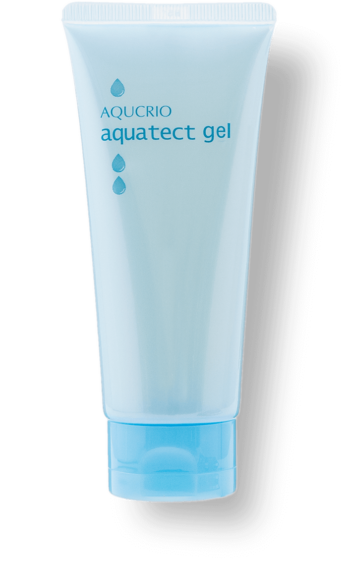
Aquatect Gel was formulated to perfect the golden water-to-oil ratio of 8:2, and it completes your skincare with just one bottle.
For people who believe that using many products is the key to perfect skin, this may not be the product for you.
However, if you’ve read this far, it should be clear why it is better to complete your skincare with just one product.
The reason why skincare companies create so many products is merely for profit.
The more products they make, the more people will buy them.
However, this completely goes against the purpose of correct moisturization.
If you are serious about revising your skincare routine and achieving healthy, glowing skin, please give Aquatect Gel a try.

FAQ
Q: Is it bad to moisturize too much?
A: Causing friction to the skin can lead to dryness and other skin issues.
Generally, it is not a bad thing to moisturize too much.
But moisturizing many times means you are touching your skin more.
Every time you touch your skin, you cause friction and irritation.
If your skin does not feel dry, there is no need to forcefully moisturize.
Q: Will my acne and pimples go away if I moisturize?
A: Moisturizing can prevent acne and pimples.
Skincare products do not cure pimples and acne.
This requires medical care.
However, by moisturizing correctly with the right skincare products, you can prevent acne and pimples.
The root cause of acne and pimples is dry skin.
When the skin is dry, the body produces excessive amounts of sebum to moisturize it.
Therefore, by prevent dry skin and moisturizing, you can achieve skin that is less susceptible to acne and pimples.
Q: Will my pores go away if I moisturize?
A: Moisturizing can make your pores less visible.
You cannot make pores disappear or go away.
Even people with the most beautiful skin have pores.
However, if the skin around your pores becomes inflamed due to dryness or sebum clogging, the skin becomes swollen and pores become more visible.
Therefore, it is important to moisturize the skin properly to prevent dryness and reduce the appearance of pores.
Q: How many times should I moisturize in a day?
A: Moisturize 2 times a day, once in the morning and once at night.
It is important to start your day by cleansing and moisturizing your skin.
During the day, the skin will be exposed to many irritants so it is best to spend th day with a functioning skin barrier.
After showering at night, the skin’s barrier function is very weak so it is important to moisturize immediately.
However, if your skin feels dry during the day, we recommend moisturizing frequently.
Summary
In this article, we covered the following points about moisturization.
- Basic knowledge about moisturization
- Causes of dryness
- Correct moisturization
- Product for correct moisturization
Moisturizing is something that we take for granted every day, but it is a very deep process once you know more about it.
Correct moisturization can be done by anyone, as long as you are replenishing water and oil to your skin at the same time.
Correct moisturization is crucial to strengthen the skin’s barrier function and prevent dry skin.
This is why we hope you will ensure correct moisturization and not be misled by incorrect information.

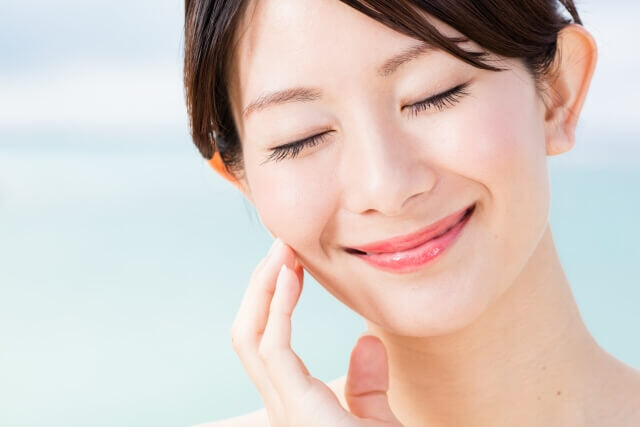


コメント